| Method | Time (sec) | Levenshtein Distance | |
|---|---|---|---|
| Free OCR (760) | ABBYY (66) | ||
| Otsu | 0.01031 | 760 | 1153 |
| Chang | 0.04720 | 328 | 133 |
| Niblack | 1.73440 | 1576 | 281 |
| Sauvola | 1.73420 | 1387 | 1025 |
| Bernsen | 1.56880 | 717 | 137 |
| Rahul | 2.87820 | 7 | 2 |
| Gatos | 6.21850 | 113 | 75 |
| Kim | 21.25000 | 61 | 18 |
| Valizadeh | 11.23500 | 69 | 26 |
Human Rights Commission The real test of the rights given by any constitution is in their actual implementation. The poor, illiterate and the deprived sections of the society must be able to exercise their rights. Independent organisations like the People's Union for Civil Liberties (PUCL) or People Union for Democratic Rights (PUDR) have been working as watchdogs against the violations of rights. In this background, the government has established in 2000 an institution, the National Human Rights Commission. The National Human Rights Commission (NHRC) is composed of a former chief justice of the Supreme Court of India, a former judge of the Supreme Court, a former chief justice of a High Court and two other members who have knowledge and practical experience in matters relating to human rights. The commissions functions include inquiry at its own initiative or on a petition presented to it by a victim into complaint of violation of human rights; visit to jails to study the condition of the inmates: undertaking and promoting research in the field of human rights etc. The commission receives complaints in thousands every year. These relate to custodial death, custodial rape. disappearances, police excesses, failure in taking action, indignity to women etc. Its most significant intervention has been on disappeared youth in Punjab and investigation and trial of Gujarat riot cases where its intervention proved effective. The commission does not have the power of prosecution. It can merely make recommendations to the govemment or recommend to the courts to initiate proceedings based on the inquiry that it conducts.
Human Rights Commission The real test of the rights given by any constitution is in their actual implementation. The poor, illiterate and the deprived sections of the society must be able to exercise their rights. Independent organisations like the People's Union for Civil Liberties (PUCL) or People Union for Democratic Rights (PUDR) have been working as watchdogs against the violations of rights. In this background, the government has established in 2000 an Institution, the National Human Rights Commission. The National Human Rights Commission (NHRC) is composed of a former chief justice of the Supreme Court of India, a former Judge of the Supreme Court, a former chief Justice of a High Court and two other members who have knowledge and practical experience in matters relating to human rights. The commission's functions include inquiry at its own initiative or on a petition presented to it by a victim into complaint of violation of human rights; visit to Jails to study the condition of the inmates; undertaking and promoting research in the field of human rights etc. The commission receives complaints in thousands every year. These relate to custodial death, custodial rape, disappearances, police excesses, failure in taking action, indignity to women etc. Its most significant intervention has been on disappeared youth in Punjab and investigation and trial of Gujarat riot cases where its intervention proved effective. The commission does not have the power of prosecution. It can merely make recommendations to the government or recommend to the courts to initiate proceedings based on the inquiry that it conducts.
 [TOP]
[TOP]Human Rights Commission The real test of the rights given by any constitution is in their actual Implementation. The poor, illiterate and the deprived sections of the society must be able to exercise their rights. Independent organisations like the People's Union for Civil Liberties (PUCL) or People Union for Democratic k^hts (PUDR) have been working as watchdogs against the violations of tights. In this background the government has established in 2000 an institut I National Human Rights Commi^Mo The National Human Rights Commission (NHRC) Is composed of a former chief justice of the Supreme Cour of India. Ir rmer judge of the Supreme Court, a former chie juMik a High ( ourt and two other members who have knowledge and practical experience in matters relating to human rights. The commission's functions include inquiry at its own initiative or on a petition presented to it by a victim into complaint of violation of human rights; visit to jails to study the condition of the inmates; undertaking and promoting research in the field of human rights etc. The commission receives complaints in thousands every year. These relate to custodial death, custodial ;ap< . disappearances, polk e excesses, failure in taking action, indignity to w< men ete I s most significant intervention has been on disappeared youth in Punjab and investigation and trial of Gujarat riot cases where its intervention proved effective. The commission does not have the power of proercution. It can merely make recommendations to the government or recommend to the courts to initiate edings based on the inquiry that It conducts.
 [TOP]
[TOP]Human Rights Commission
'The real test of the rights given by any constitution is in
their actual Implementation. The poor, illiterate and the
deprived sections of the society must be able to exercise
their rights. Independent organisations like the People's
Union for Civil Liberties [PUCL} or People Union for
Democratic Rights {PUDR} have been working as
watchdogs against the violations of rights. In this
background, the government has established in 2000 an
institution, the National Human Rights Commission.
The National Human Rights Commission (NHRC) is
composed of a former chief justice of the Supreme Court
of India, a former judge of the Supreme Court, a former
chief justice of a High Court and two other members who
have knowledge and practical experience in matters
relating to human rights.
The commissions functions include inquiry at its own
initiative or on a petition presented to it by a victim into
complaint of violation of human rights; visit to jails to
study the condition of the inmates: undertaking and
promoting research in the field of human rights etc.
The commission receives complaints in thousands
every year. These relate to custodial death, custodial rape.
disappearances, police excesses, failure in taking action,
indignity to women etc. Its most significant intervention
has been on disappeared youth in Punjab and
investigation and trial of Gujarat riot cases where its
intervention proved effective.
The commission does not have the power of
prosecution. It can merely make recommendations -to the
govemment or recommend to the courts to initiate
proceedings based on the inquiry that it conducts.Human Rights Commission The real test of the rights given by any constitution is in their actual implementation. The poor, illiterate and the deprived sections of the society must be able to exercise their rights. Independent organisations like the People's Union for Civil Liberties (PUCL) or People Union for Democratic Rights (PUDR) have been working as watchdogs against the violations of rights. In this background, the government has established in 2000 an Institution, the National Human Rights Commission. The National Human Rights Commission (NHRC) is composed of a former chief justice of the Supreme Court of India, a former Judge of the Supreme Court, a former chief Justice of a High Court and two other members who have knowledge and practical experience in matters relating to human rights. The commission's functions include inquiry at its own initiative or on a petition prrsented to it by a victim into complaint of violation of human rights; visit to Jails to study the condition of the Inmates; undertaking and promoting research in the field of human rights etc. The commission receives complaints in thousands every year. These relate to custodial death, custodial rape, disappearances, police excesses, failure in taking action, indignity to women etc. Its most significant intervention has been on disappeared youth in Punjab and investigation and trial of Gujarat riot cases where its intervention proved effective. The commission does not have the power of prosecution. It can merely make recommendations to the government or recommend to the courts to initiate proceedings based on the inquiry that it conducts.
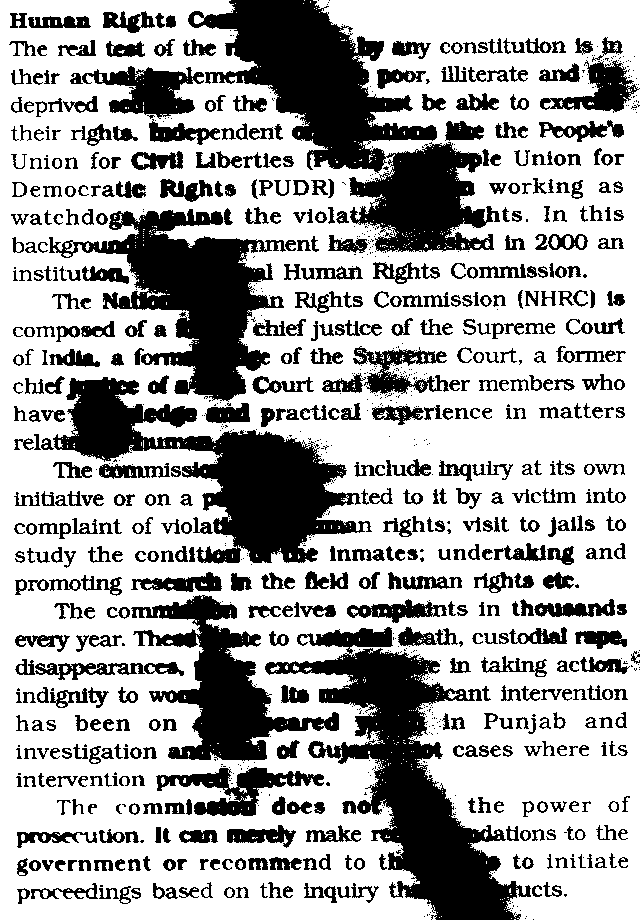 [TOP]
[TOP]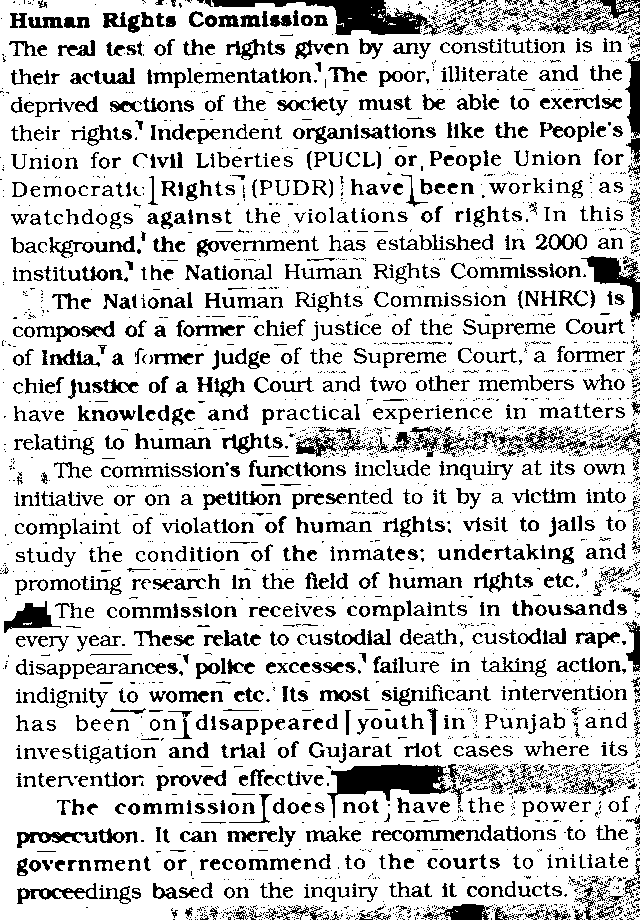 [TOP]
[TOP]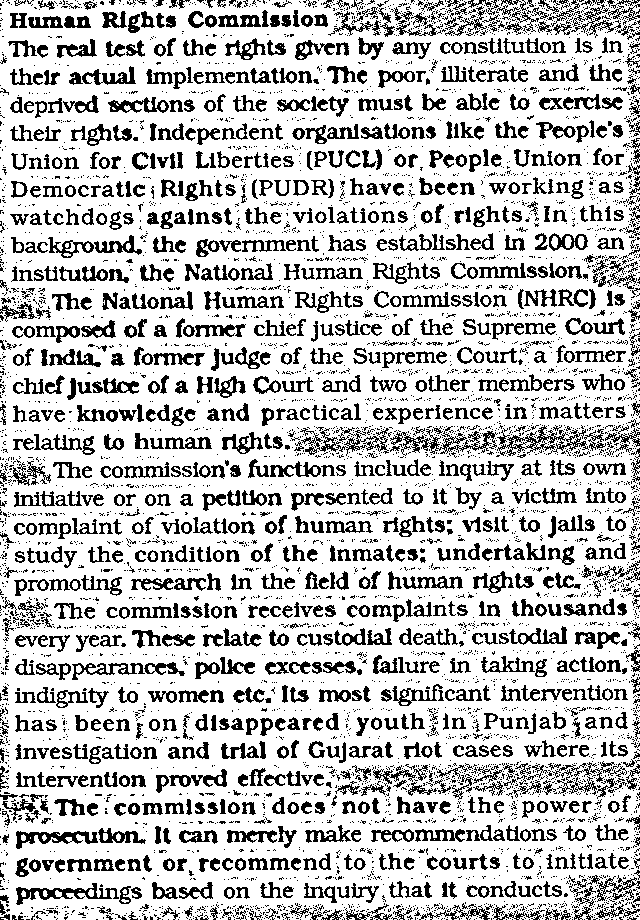 [TOP]
[TOP]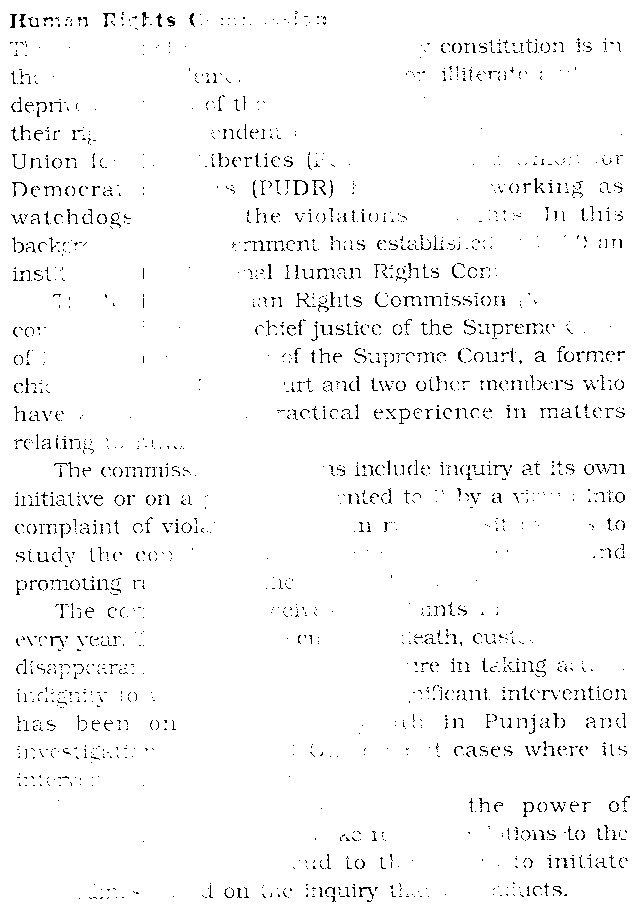 [TOP]
[TOP] [TOP]
[TOP]Human Rights Commission The real test of the rights given by any constitution is In their actual Implementation. The poor, illiterate and the deprived sections of the society must be able to exercise their rights. Independent organisations like the People's Union for Civil Liberties (PUCL) or People Union for Democratic Rights (PUDR) have been working as watchdogs against the violations of rights. In this background, the government has established in 2000 an institution, the National Human Rights Commission. The National Human Rights Commission (NHRC) !s composed of a former chief justice of the Supreme Court of India, a former Judge of the Supreme Court, a former chief Justice of a High Court and two other members who have knowledge and practical experience in matters relating to human rights. The commission's functions include Inquiry at its own initiative or on a petition presented to it by a victim into complaint of violation of human rights; visit to jails to study the condition of the inmates; undertaking and promoting research in the field of human rights etc. The commission receives complaints In thousands every year. These relate to custodial death, custodial rape, disappearances, police excesses, failure in taking action, indignity to women etc. Its most significant intervention has been on disappeared youth in Punjab and investigation and trial of Gujarat riot cases where its intervention proved effective. The commission does not have the power of prosecution. It can marly make recoMBfcndations to the government or recommend to the courts to initiate proceedings based on the inquiry that ratanducts.
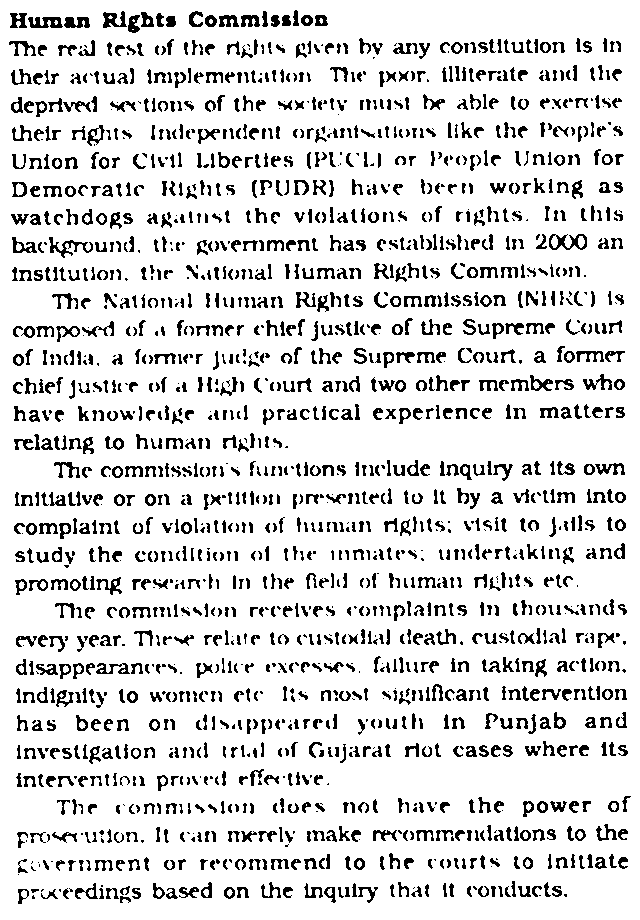 [TOP]
[TOP]Human Rights Commission The rr;d test of the rights given by any constitution is In their actual Implementation The p<x>r. illiterate ami the deprived sections of the Mx lctv must be able (o exorcise their rights Independent organisations like the People's Union for Civil Liberties (Pl'CU or People Union for Democratic Rights (PUDKJ have hern working as watchdogs against the violations of rights, in this background, the government has established In 2000 an Institution, the National Human Rights Commission. The National Human Rights Commission (NHKC) Is composed of .1 former t hief justice of the Supreme Court of India, a former Judge of the Supreme Court, a former chief Justice of a High Court and two other members who have knowledge and practical experience in matters relating to human rights. The commission's functions Include inquiry at Its own Initiative or on a petition presented to It by a victim Into complaint of violation of human rights; visit to j.dls to study the condition ol the inmates; undertaking and promoting researvh In the field of human rights etc The commission receives complaints In thousands ever)' year. These relate to custodial death, custodial rape, disappearances, police excesses failure in taking action. Indignity to wort ten etc Its most significant Intervention has been on disappeared youth in Punjab and Investigation and trial of Gujarat riot cases where its intervention proved rffe< tlve. The commission does not have the power of pros<vu*lon. It can merely make recommendations to the government or recommend to the courts to Initiate prcxeedings based on the Inquiry that it conducts.
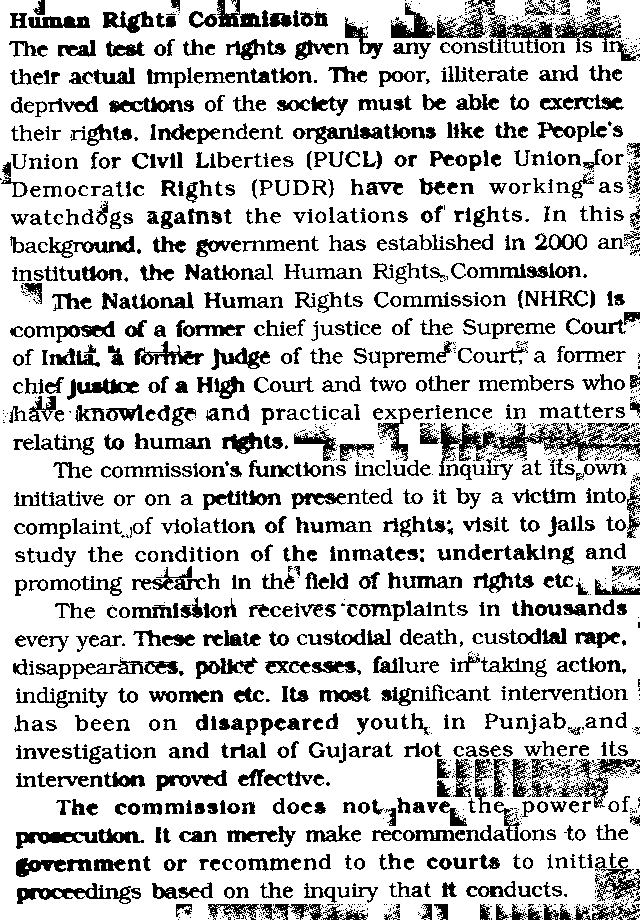 [TOP]
[TOP]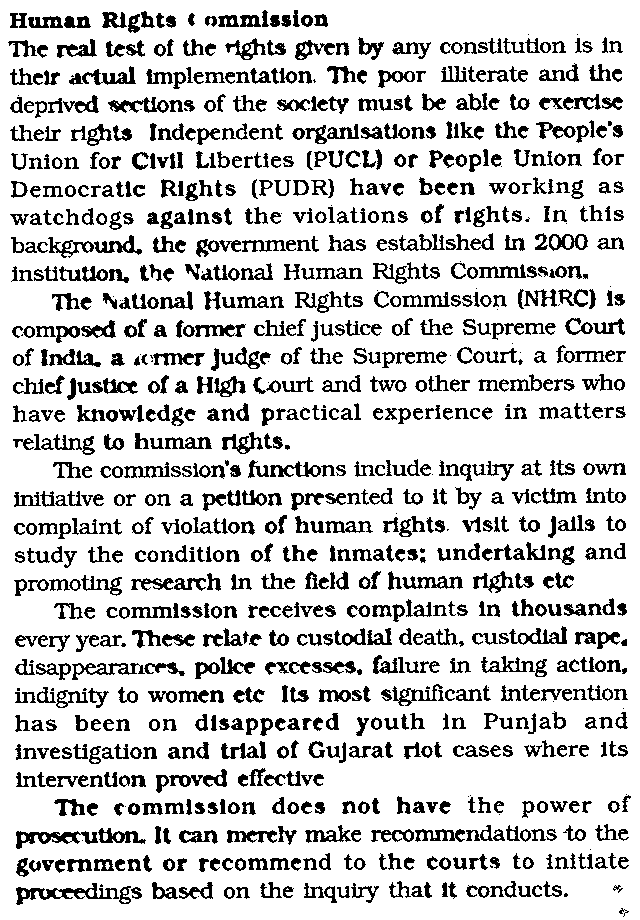 [TOP]
[TOP]Human Rights < ommlssion The real test of the fights given by arty constitution Is In their actual implementation. The poor illiterate and the deprived sections of the society must be able to exercise their rights Independent organisations like the people's Union for Civil Liberties (PUCL) or People Union for Democratic Rights (PUDR) have been working as watchdogs against the violations of rights. In this background, the government has established in 2000 an Institution, the National Human Rights Commission, The National Human Rights Commission (NHRC) is composed of a former chief justice of the Supreme Court of India, a <ormer Judge of the Supreme Court, a former chief Justice of a High Court and two other members who have knowledge and practical experience in matters relating to human rights. Hie commission's functions include inquiry at its own initiative or on a petition presented to it by a victim into complaint of violation of human rights visit to Jails to study the condition of the Inmates; undertaking and promoting research in the field of human rights etc The commission receives complaints In thousands every year. These relate to custodial death, custodial rape, disappearances, police excesses, (allure in taking action, indignity to women etc Its most significant intervention has been on disappeared youth in Punjab and investigation and trial of Gujarat riot cases where its intervention proved effective The commission does not have the power of prosecution. It can merely make recommendations to the government or recommend to the courts to initiate proceedings based on the inquiry that It conducts. *